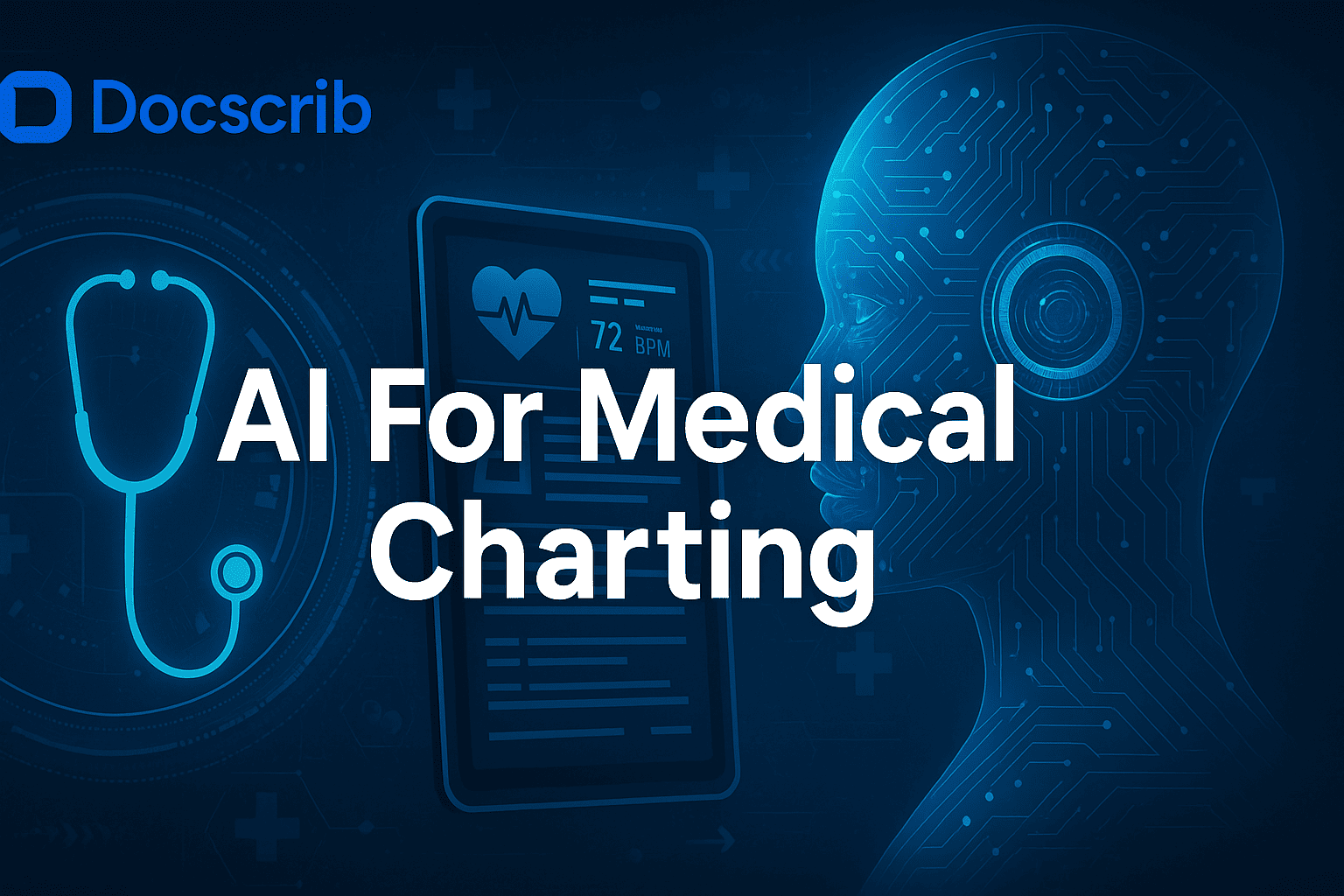Updated on: July 9, 2025
Clinical documentation is a critical part of healthcare—but let’s face it, it’s also one of the most time-consuming and draining aspects of a clinician’s day. The good news? The rise of AI for medical charting is transforming how healthcare professionals capture, process, and complete patient notes.
In this guide, we’ll explore how AI-powered charting tools—including Virtual Medical Scribes like Docscrib—are helping clinicians save time, reduce burnout, and enhance patient care.
The Problem with Traditional Medical Charting
Clinicians today spend up to 50% of their workday on documentation and EHR management—often extending into after-hours “pajama time.” The consequences include:
-
Increased physician burnout
-
Reduced patient face-time
-
Slower billing and revenue cycles
It’s clear: something needs to change. Enter AI for Medical Charting.
What is AI for Medical Charting?
AI for medical charting refers to the use of Artificial Intelligence, Natural Language Processing (NLP), and Machine Learning to:
- Capture patient-provider conversations
- Generate accurate clinical notes automatically
- Sync notes with Electronic Health Record (EHR) systems in real time
This technology eliminates the need for tedious manual note-taking—allowing clinicians to focus more on patient care and less on keyboards.
How Virtual Medical Scribes Like Docscrib Transform Charting
One of the most accessible ways to implement AI for charting is through Virtual Medical Scribes like Docscrib.
Here’s how it works:
-
The AI listens to your patient encounters securely.
-
It transcribes and intelligently structures the conversation into a SOAP note.
-
The note integrates with your EHR—ready for your review and signature.
👉 Experience the difference—Schedule a Free Docscrib Demo:
Get Started ➔
Key Benefits of AI For Medical Charting
| Benefit | How It Helps Your Practice |
|---|---|
| ⏳ Time Savings | Chart in real time—no after-hours work |
| 😊 Reduced Burnout | Focus on patients, not paperwork |
| 📊 Improved Accuracy | Minimize errors, enhance documentation quality |
| 🚀 Faster Billing & Revenue Cycle | Quicker note completion means quicker billing |
| 💡 Better Patient Experience | More eye contact and engagement during visits |
Common Use Cases for AI Charting
🩺 Primary Care & Family Medicine
-
Routine visit documentation
-
Preventive care summaries
🧠 Mental Health & Psychiatry
-
Behavioral health notes
-
Therapy session documentation
🦴 Specialty & Surgical Care
-
Post-op notes
-
Follow-up care management
No matter the specialty, Virtual Medical Scribes like Docscrib can be customized to your unique needs.
Is AI for Medical Charting Secure?
Yes—when you choose the right provider.
✅ HIPAA-compliant platforms
✅ End-to-end encryption
✅ No unauthorized data sharing
At Docscrib, privacy and security are at the heart of everything we do. Your patients’ data stays protected—always.
👉 Learn more: Visit Docscrib
How to Choose the Right AI Medical Charting Solution
When selecting an AI charting tool, ask:
-
Is it accurate and specialty-specific?
-
Does it integrate with your EHR?
-
Is it HIPAA-compliant?
-
Will it help reduce charting time?
Docscrib checks all these boxes—and more.
AI For Medical Charting + Human Touch: A Winning Combination
AI doesn’t replace the clinician—it empowers them. With tools like Virtual Medical Scribes, you get:
- Human-centered care
- Smarter documentation
- More time for what matters most: your patients
Final Thoughts: Embrace the Future of Medical Charting
The future of healthcare is faster, smarter, and more efficient—and AI for medical charting is leading the way. By combining Virtual Medical Scribes like Docscrib with your clinical expertise, you can:
- Save time
- Reduce burnout
- Improve documentation
- Elevate patient care
👉 Don’t wait—start your AI charting journey today:
Book Your Free Docscrib Demo ➔
